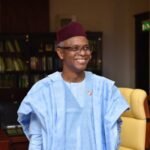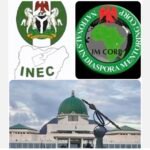(FLOWERBUDNEWS) The Federal Government has declared its determination to provide a lifelong unique identification for every individual physically residing in Nigeria and Nigerians in the diaspora within the next five years.
Director-General of the National Identity Management Commission (NIMC), Engr. Aliyu Aziz, made the declaration yesterday, June 18, 2019 while speaking at the Fifth Annual Meeting of the Identity for Africa (ID4Africa) Movement holding in Johannesburg, South Africa.
Addressing the over 1,500 delegates at the world’s largest identity for development gathering, Engr. Aziz stated that for Nigeria to enhance governance, help its people rise out of poverty, restore growth and participate in the digital economy, “we need a unique digital identification platform that is linked to functional ID registries for accessing services.”
In realisation of the demands to function in the digital economy for sustainable growth therefore, Engr. Aziz told the audience that Nigeria is executing a digital identity ecosystem project endorsed in September 2018 by the Federal Executive Council, the highest decision-making organ of government.
Laying bare the grand plan by the government in his paper titled ‘Digital Identity the Cornerstone to Effective Service Delivery’ Engr. Aziz revealed that the “Strategic Roadmap Vision is to reach universal coverage of robust digital identification in Nigeria” by applying an ecosystem approach of enrolling citizens of all ages and legal residents within the set time frame.
“The ecosystem approach of enrolment will constitute trusted partners, and a pay-per-play model for successful enrolments,” Engr. Aziz said, adding “the purpose of the ecosystem approach is to leverage existing capabilities and enrolment facilities of government agencies, partners and private sector operators in Nigeria, as opposed to building new ones.”
Explaining further, he said the ecosystem approach leverages the capacity of “all ID stakeholders in the ecosystem to reach full coverage of the target population.”
Engr. Aziz listed some unique and beneficial features of the digital ID ecosystem approach to include, among others:
- Federal Government-led initiative to collect biometric data nationwide in one go;
- coordinated effort to avoid duplicating data collection at high cost and time;
- leverage existing ecosystem of Government agencies (including Federal, State and LGAs) and Private sector organisations;
- NIMC facilitates collecting identity data (biometric and demographic data)
- Partners collect data and are paid per successful enrolment;
- NIMC stores data and uses same to offer a Unique ID.
The director-general named some of the stakeholders and partners in the ecosystem approach to include the National Population Commission, Nigeria Immigration Service, Federal Inland Revenue Service, Central Bank of Nigeria, National Health Insurance Scheme, National Independent Electoral Commission and the Federal Road Safety Commission.
Others include the Corporate Affairs Commission, Nigerian Communications Commission, Joint Admissions and Matriculation Board, the Nigeria Police Force and the National Pension Commission.
He said on January 1, 2019 government began the mandatory enforcement of the use of the National Identification Number (NIN) for such services like application for and issuance of passport, registration of voters, opening of bank accounts, all consumer credit transactions, purchase of insurance policies, transactions with social security implications, all land related transactions, transactions specified under the contributory health insurance scheme, payment of taxes, transactions pertaining to pension, admission into schools and all other relevant government services.
“Proving ‘who is who’ in Nigeria is critical to accessing services physically and electronically as well as in identifying the targeted beneficiaries of a programme, project or scheme,” Engr. Aziz reasoned.
According to him, “there is a strong correlation between identification and service delivery and this is central in the effective delivery of important services to the people by the Federal Government.”
He said there was no option for Nigeria than embrace and implement digital identity as “all modern economic services are done digitally and rely on good identification in order to promote economic growth and opportunities.”
Engr. Aziz said the benefits of the digital identity ecosystem approach are, among others, to scale up enrolment, extend coverage nationwide, reduce cost in data collection, speed-up delivery, provide digital verification of ID anytime and anywhere in Nigeria, just as a well-developed digital identification program will help deliver the government’s development agenda, and provide for key government services, such as safety net, financial inclusion, security and agriculture.








